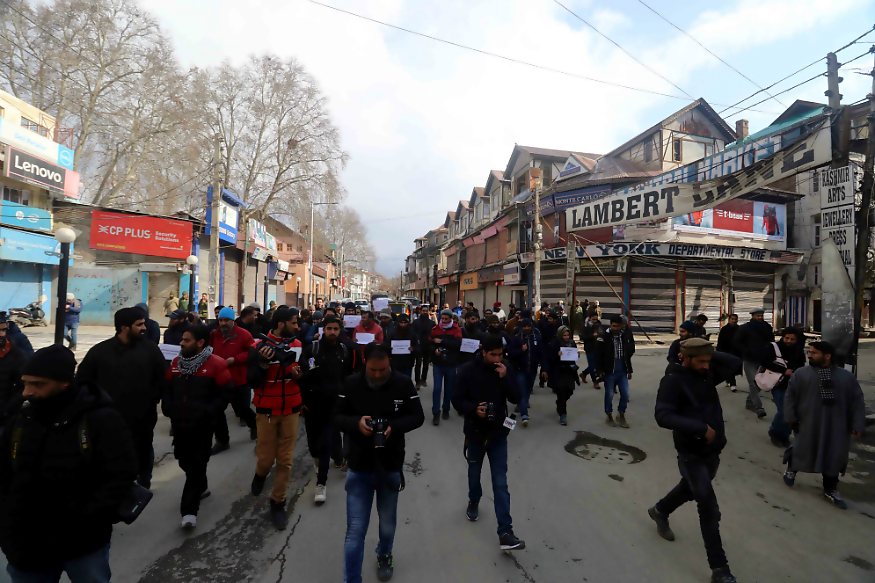
views
Srinagar: Journalists in Srinagar on Saturday boycotted the main Republic Day function after a number of senior scribes working with national and international news organisations were barred from covering the event held at SK stadium in the Kashmir capital.
Condemning the gag by the authorities, journalists took out a protest rally from the Kashmir Press Club and marched towards the historic clock tower at the City Centre. The Kashmir Editors Guild (KEG) has demanded action against the officials who denied passes to the journalists.
“KEG demands that the state government take stringent action against the police officers who sought to muzzle the press and take steps to create a situation where media can function freely and discharge its duty to the citizens by providing information on the happenings in the state,” the KEG said in a statement.
Some of the journalists, who had gone to cover the Republic Day celebrations, were told at the security checkpoint that “they cannot enter”, despite having received official passes from state’s information department.

Journalists at the protest rally in Srinagar.
Nearly one dozen journalists were put on the “blacklist”.
These included veteran journalists Yusuf Jameel, Mehraj ud Din (Associated Press), Habib Naqash (GreaterKashmir), Tauseef Mustafa (AFP), Bilal Bhat (ANI) and Ashraf Wani (AajTak). Journalists Danish Ismail (Reuters) and Amaan Farooq (GreaterKashmir) were also barred.
“It has not happened for the first time that journalists have been stopped from performing their professional duties. Restrictions are imposed routinely — curfew passes are not issued and the internet is regularly snapped,” said veteran journalist Yusuf Jameel told News18.
Terming the incident as “part of state’s indirect and unofficial censorship,” Jameel said, “It is the loss of state if they continue to stop journalists. It is more surprising that journalists who were issued passes by the information department were not allowed. This is a very unfortunate incident.”
The additional director general of Police, Munir Khan, told News18 that “there must be some reason because of which journalists were stopped.” He added, “I have asked IG Kashmir and SSP security for a detailed report. Those journalists who are invited are allowed inside only after proper verification. We are checking the facts. A detailed report will be put forth,” he said.
The Kashmir Editors Guild has also demanded that the “details of the so-called adverse reports that the police claims it has collected against the senior scribes” be revealed.
The journalists in Kashmir continue to face difficult situations. A few days ago four journalists were injured after armed forces fired pellets at them when they were on their way to cover a gunfight between militants and forces in south Kashmir’s Shopian district. Pellets had hit them in face and head.
Kashmir Video Journalist Association (KVJA) and Kashmir National Television Journalist Association had condemned the incident and asked the state’s governor and DGP to initiate strict action against those responsible.
“This has become a routine that journalists performing their professional duties are either thrashed or showered with pellets. KVJA appeals to the governor and DGP to initiate strict action against those involved in the incident and make sure it doesn’t happen in the future,” KVJA said in a statement said.
Foreign correspondents are not allowed to visit Kashmir without prior permission from the Ministry of Home affairs (MHA). Last year, only two foreign journalists were allowed to visit the state. International journalist rights bodies have already expressed their concern over the safety of journalists in Kashmir.
In a statement to the MHA, Community to Protect Journalists (CPJ) said that reporting the conflict in Kashmir is a public service and not a criminal act.
The statement said journalists have “long operated in a dangerous environment in Kashmir and we are extremely concerned about the climate for the press freedom.”
In the past year, CPJ has documented various attacks against journalists, including the murder of Shujaat Bukhari and the questioning and detention of multiple reporters for their work.




















Comments
0 comment